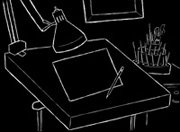
When Roberto Rossellini set aside fictional narratives for educational films, he immersed himself in the world of history and knowledge. But his goal was not to teach in the pedantic sense. Rossellini wanted to give the viewer a more complete experience, to imbue his studies of historical figures with the essence of life in the times in which they lived.
Criterion has released three of the Italian director’s films—Cartesius, Blaise Pascal, and The Art of the Medici—as part of a boxed set, Rossellini’s History Films. It is the 14th volume in the company’s Eclipse series, spotlighting overlooked films in inexpensive, pared-down editions that feature restored prints and thoughtful essays, but no supplemental features.
Cartesius (1974) tracks the life and life’s work of Descartes in his relentless pursuit of reason and science over emotion, faith and perception. Descartes is always wandering, always leaving one place for another. He arrives in a town, takes in its culture, and soon tires of it, moving on to another place with different people, different customs, different perspectives. It seems that half the scenes begin with someone telling Descartes how glad they are to meet and talk with him, and asking how long he’ll stay. The answer is always some version of, “Not long, I’m afraid. Tomorrow I set out for....”
Rossellini depicts Descartes as driven yet somehow lifeless. He has little expression and little joy, and indeed little companionship to offer to others, beyond intellectual discussions of scientific theories. He rarely partakes of the life around him but instead spends much of his time retreating into solitude after repeatedly thrusting his head into the spotlight. His life is an endless quest for empirical evidence, and, though Rossellini finds much to admire in that, he highlights the toll it takes on Descartes, crippling the philospher-scientist with a lack of love and grace.
In the end, Descartes comes to a solemn conclusion: “Science has prevented me from living.”
Though Blaise Pascal (1972) was made before Cartesius, it serves as something of an antidote to the later film. Pascal, too, is in search of reason and logic, but he is also searching for something more, something higher than facts, something not so much to believe as to believe in. He feels his quest for the hard truth of science is empty without a faith to encompass it.
Rossellini even stages a (fictional) confrontation between the two men, where Pascal questions the older Descartes after a lecture. It is a study in contrasts, as the earnest Pascal embodies youth and grace and love as he challenges and rebuts the cold, stolid facts of the seemingly depleted older man.
Rossellini’s history films were made for television, not for the big-screen experience of the theater. And that fact, combined with their subject matter and an emphasis on education rather than entertainment, makes for films that are more expository than cinematic, consisting primarily of conversations and dialogue as opposed to action.
Blaise Pascal and Cartesius employ virtually the same score, an evocative if mysterious tolling of chimes that at times sounds like the ambient noise of church bells filling each scene. And, when each philospher-scientist begins one of his many monologues, a quiet, creeping, almost chilling minimalist theme sets in, as though to cue the viewer that a key intellectual argument is being made. You can almost see classrooms of students hurriedly taking out their notepads at Ros-sellini’s signal.
Criterion. $59.95. www.criterion.com.






